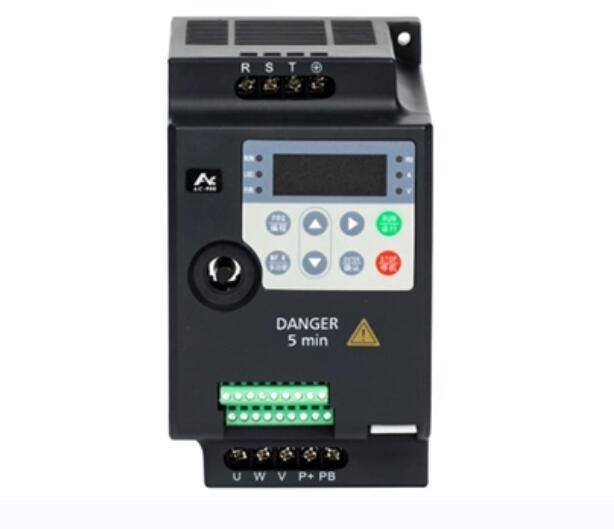Variable Frequency Drive
Product Description
Variable Frequency Drive (VFD), also known as a variable speed frequency drive or adjustable frequency drive, is an electronic device used to control the speed and torque of an electric motor. It allows for the precise control of motor speed by varying the frequency and voltage of the electrical supply to the motor. VFD frequency inverter offers several benefits, including energy savings, improved motor performance, and reduced mechanical stress on equipment. They are widely used in industrial and commercial applications, such as pumps, fans, conveyors, and HVAC systems, to optimize motor operation and increase overall system efficiency.
Different types of vfd
AC100 Mini Frequency Inverter
AC100 Mini vector control frequency inverter is a compact and efficient device designed for controlling the speed of electric motors. It offers precise control and can be used in various applications such as pumps, fans, and conveyors. With user-friendly interface and advanced technology, it ensures reliable performance and energy savings.
AC900 Variable Frequency Inverter 380V
The AC900 variable frequency drive china is a powerful and versatile device designed for controlling the speed and performance of motors operating at 380V voltage. It provides advanced features and functions to ensure precise and efficient control in various industrial applications. With its robust design and easy-to-use interface, it delivers reliable performance, energy savings, and improved productivity.
220V Single Phase To 380V Three Phase Converter
The 220V single phase to 380V triple phase inverter is a compact and efficient device that allows the conversion of single-phase power supply to three-phase power supply. It is designed to provide a reliable and stable power source for three-phase motors and equipment, enabling them to operate at their full capacity. With its user-friendly design and high-performance capabilities, it is suitable for a wide range of industrial and commercial applications.
Benefits and Advantages of Using VFDs in Motor Control
Energy savings
VFDs allow for precise control of motor speed, resulting in significant energy savings. By adjusting the frequency and voltage supplied to the variable speed drive motor based on the required load, VFDs eliminate the need for fixed-speed operation and reduce energy consumption.
Improved motor performance
Produced by a leading frequency inverter China factory, VFDs provide smooth acceleration and deceleration, reducing stress on the motor and extending its lifespan. They also allow for precise speed control, enabling better process control and improved productivity in various applications.
Reduced wear and tear
By eliminating the need for mechanical starters or other control devices, almost all types of VFD drives reduce the mechanical strain on motors, resulting in lower maintenance costs and increased reliability.
Soft-start capabilities
VFDs offer soft-start functionality, gradually ramping up the motor speed to prevent sudden surges and excessive current draw during startup. This feature of the variable frequency drive system minimizes the mechanical stress on motors, belts, and other connected equipment.
Variable frequency drive (VFD) systems have several key features that contribute to their effectiveness and versatility. Here are some common features of VFD systems:
1. Speed Control: VFDs allow for precise control of motor speed by adjusting the frequency and voltage of the power supplied to the motor. This enables smooth and efficient operation, as the motor can be tailored to match the specific requirements of the application.
2. Energy Savings: VFDs offer significant energy-saving benefits by optimizing motor speed and power consumption based on the load demand. By adjusting the motor speed to match the required output, VFDs can reduce energy consumption compared to traditional fixed-speed systems, where motors run at a constant speed regardless of the load.
3. Soft Start and Stop: VFDs enable smooth starting and stopping of motors, preventing sudden surges or jolts. This feature not only minimizes mechanical stress and wear on the motor and connected equipment but also reduces energy demand during start-up.
4. Torque Control: VFDs provide precise torque control, allowing for greater flexibility and accuracy in various applications. This feature enables precise control over the motor's output torque, ensuring optimal performance in tasks such as starting heavy loads or maintaining constant torque in varying load conditions.
5. Dynamic Motor Braking: VFD systems can implement dynamic motor braking, which enables controlled deceleration and stopping of motors. This feature is particularly useful in applications where quick and controlled stopping is necessary, such as in conveyor systems or hoists.
6. Overload and Fault Protection: VFDs incorporate advanced protection mechanisms to safeguard motors and connected equipment. These systems can monitor parameters such as current, voltage, temperature, and motor stalling to detect and respond to faults or overloads. They can also provide alarms or shutdown features to prevent equipment damage and ensure personnel safety.
Variable frequency drive systems are known for their versatility, efficiency, and ability to enhance motor control across a wide range of applications. Their features contribute to energy savings, precise control, protection, and ease of operation, making them a popular choice in various industries.
For more information about variable speed drive cost and frequency of inverter, please feel free to contact us!
